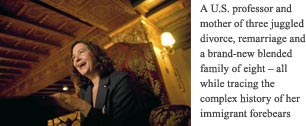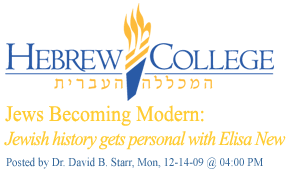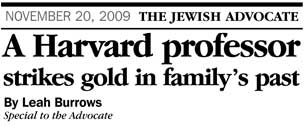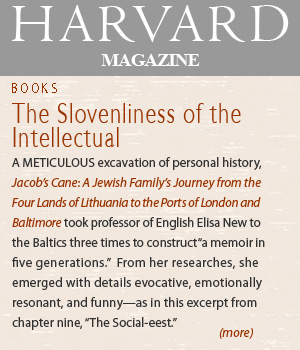 |
|
|

Author in Kenly
Author Elisa New will read from her new book
|
 |
Jacob's Cane Reveals the Past
by Jonathan Kirsch
|
|
|
|

Sarah Hampson: The Interview
Author Elisa New delves into her family's path –
and rewrites her own future
 |

|
 |

A Forward interview 3.29.10 |

|
 |
Check back for Podcast
March 18, 11:45 PM
Live Interview on the Joey Reynolds Show
|

|
 |

Interview with Don Rodricks
|

|
 |

|

|

Posted by Dave Rosenthal, Baltimore Sun Assistant Managing Editor, Thursday, 01.22,10
|

|

By Sarah Sweeney,
Harvard Staff Writer,
Thursday, 12.17,09 |

|

|

|

Winter 2009
|

|

|

|

|

|
 
|
|
Interview with Elisa New & Yael Levine on RTVi, Russian TV International
|

|
 10/7/2009 8:59:00 PM 10/7/2009 8:59:00 PM
Bringing her family to life
Scholar writes about 19th-, 20th-century Baltimore, London, Baltic states
by Aaron Leibel, Arts Editor
|

|

|

|

|
|
    |
| Reviews |
 |
| Blog by Toby Anne Bird reviews Jacob's Cane |
|
 |
 |
| Reviewed by Agi Erdos July 2010 |
"Inspired by the mysterious engraving on her great-grandfather Jacob's old walking cane, English professor Elisa New embarks on a journey to eastern Europe to retrace her ancestral roots. In this mixture of biography, personal journal, and world history, the narrative of forebears long dead is pieced together like a puzzle and characters from the fading family photos come alive as the author combines the information she gathers from documents and from living relatives with her own imagination." (more) |

|
 |
|
". . . Like all ritual activities, the making of genealogies has a vertical and a horizontal dimension. In the vertical dimension, the research links the present with the past and us with our ancestors, as well as, by implication, with God. In the horizontal dimension, the quest stops being an individual effort and becomes a group one, and the compilation of the family history becomes the thing that pulls the family together. Again and again in these stories, and New’s interesting book is no exception, you hear tales of sisters and brothers, mothers and daughters, or long-lost cousins strengthening their bond by traveling together in search of the past; of family members being discovered and brought back into the tribe; of old breaches between estranged kin being healed in the joy or sorrow of learning what happened to the lost. Amassing the details and telling the story of who you come from turns out to be one of the primal means of reconstituting your tribe. The genealogy comes to heal a broken world, a feat it is usually able to accomplish whether or not it is turned into genealogical narrative."
|

|
 |
|
". . . Above all, “Jacob’s Cane” is the work of a writer with a love of language. . . .At these moments, New is a kind of alchemist who is capable of turning the raw materials of the historian — “wanderings, guesses, luck and old glue,” as she puts it — into the poet’s gold."
|

|
|
Posted by:jewwishes|11.30.09
"If you are looking to read a family saga, one that chronicles life through several generations of a Jewish family, then Jacob’s Cane is the book for you. From the moment I began reading it, I couldn’t put it down . . . "
|

|
 Xpress Reviews— Xpress Reviews—
First Look at New Books
|

|

November 1, 2009
" . . . this is an engrossing and fast-moving story that traces her family’s joys and heartaches over five generations and two continents . . . New’s account of these men and their progeny is often emotionally stirring, especially as they interact with the great events of the last century. " |
|
  |
|
By Diane Scharper Special to The Baltimore Sun
November 15, 2009
Rich with details, "Jacob's Cane," Elisa New's memoir, makes up in poetic language what it lacks in conciseness. New's account begins with Jacob Levy's arrival in America and the fabric-finish business that he started in the basement of his West Lombard Street rowhouse in the late 1880s. He was so successful that he soon opened a factory on Baltimore's Redwood Street. But as New describes it, his personal life was unhappy. His wife and youngest son suffered from mental illness and had to be institutionalized. Three other sons followed a wealthy uncle to London instead of helping their father with his fabric business. New focuses on the indomitable Levy (her great-grandfather) and the cane that she found in her cousin's Baltimore house. Marked with place names, the cane led New to her family's roots in a small town near the Jewish cultural center of Kaunas, Lithuania, and to their years in Baltimore as entrepreneurs and members of the Jewish upper-middle class. A Harvard University professor, New embellishes her narrative with anecdotes from her great-aunts about life in 1920s Baltimore, reflections on Lithuanian history, customs, foods and language, as well as meditations on family photographs. As New tells her family's story, she adds her own history, noting her divorce and her second marriage to Larry Summers, economist and adviser to President Barack Obama. Her discursive book ranges from bucolic descriptions of the verdant Lithuanian countryside to nightmarish recollections of Jewish persecution.
Diane Scharper teaches English at Towson University.


"Harvard English professor New (The Line's Eye)—wife of former Harvard president and current Obama adviser Larry Summers—traces the journeys of two family patriarchs from Eastern Europe as she unravels the mysterious etchings on her great-grandfather's elegant cane. Great-grandfather Jacob Levy and great-great-uncle Bernhard Baron, both Jewish immigrants from the Baltic States, met in Baltimore, become friends and joined their families through marriage, but later became bitter rivals. Bernhard moved to London, where he became a tobacco magnate and legendary philanthropist who implemented a progressive set of workers' benefits. His Black Cat London factory is hailed today as a great art deco achievement. Jacob was a scholar, inventor and businessman who made a quixotic 1914 congressional run as the Socialist Party candidate. He founded a firm that today is a giant textile processor. But three of his sons chose to join Bernhard in London and changed their names to Baron. Although meandering and wordy, this engrossing memoir/family history vivifies the singular successes and tragedies of a memorable clan and should inspire readers to seek out their own family stories."

|












